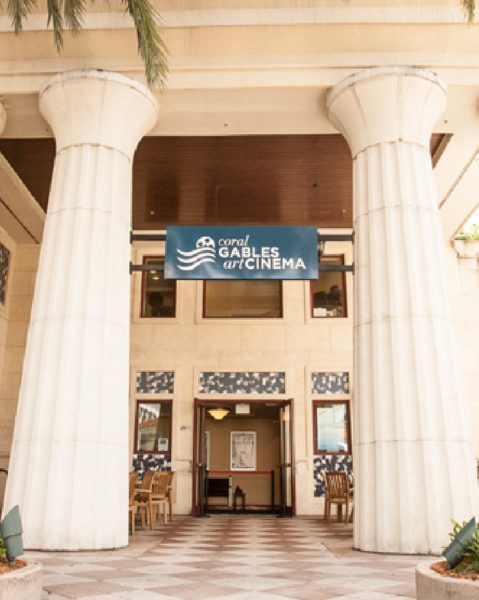At Coral Gables Art Cinema in Miami, Florida, co-executive director Brenda Moe and her colleagues had been ramping up for a new monthly series on movie musicals. Then the coronavirus hit.
“We actually didn’t get to launch it, because it was starting this month,” Moe tells Boxoffice Pro. “So we hope to”—she pauses—“well, we will be picking that [back] up.”
Moe’s mid-sentence correction is indicative of her optimistic state of mind. Forced to shutter operations on March 18 due to a city-wide mandate, the non-profit, single-screen theater is now fighting for its future. But despite the catastrophic turn of events, Moe is confident they can weather the storm.
To help ensure its survival, the theater has implemented a membership and gift card drive (memberships at all levels are currently being offered at 25% off) that has so far raised over $25,000, what Moe calls “greatly needed padding.” Still, she adds, “Having zero ticket sales revenue is a big deal. It’s really scary.” Since the closure, the theater has been forced to lay off 80% of its staff. It is now applying for the Small Business Administration’s paycheck protection program.
Part of Moe and company’s plan to save the theater involves a robust community engagement initiative that includes what is being billed as a digital “drive-in” series. Each day, three new public-domain movies are screened on the theater’s official website for free, and the list—populated by such classics as Night of the Living Dead, Orson Welles’ The Stranger and silent films like Phantom of the Opera and Charlie Chaplin’s The Gold Rush—is more impressive than you might imagine.
As Moe tells it, the “drive-in” initiative grew out of an effort to build the theater’s social media calendar during the closure. “Everybody [was] providing resources, you know, streaming suggestions,” she says. But for a philanthropy-minded theater whose programming includes a “pay what you can” children and family program for those who wouldn’t ordinarily be able to afford a night out at the movies, Moe and the rest of the leadership team felt that spotlighting paywalled movies on services like Netflix and Hulu wasn’t necessarily the answer.
After talk turned to suggesting movies you could watch for free instead, the theater came across a resource that lists films in the public domain—i.e. those that don’t require a license to screen—and the “drive-in” series was born. As of last Thursday (April 2), Moe reported it had drawn over 4,000 visitors.
Not content to rest on their laurels, Coral Gables is getting even more creative with the initiative. This coming Saturday (April 11), the theater will host a somewhat more literal version of drive-in cinema on the theater’s Instagram Live account, where William Castle’s House on Haunted Hill—voted on by users—will be projected on an outdoor screen and broadcast to viewers who tune in on the platform. (In a clever touch, miniature cars owned by Moe’s young son will be placed in the frame to better evoke the drive-in experience.)
The virtual drive-in initiative is part of a broader push to keep the Coral Gables Art Cinema alive in the minds of its patrons, says Moe, who participates in an online forum of arthouse theater owners. “Everybody [in the forum] is trying to find ways to keep your community engaged, monetize your content, and stay in front of your audience. Because [if] you are gonna reopen, you need them there.”
Coral Gables Art Cinema has cultivated a loyal following in the decade since its founding, with patrons drawn by the theater’s commitment to screening true arthouse cinema (both foreign-language and American) alongside buzzier, more mainstream independent titles.
“A pillar of our mission is identifying smaller movies that you’re not going to find in cinemas nearby that are really, really great and should be discovered by the community,” says Moe, who adds that new films which would have been programmed at Coral Gables under normal circumstances are now available to watch via a “virtual screening room” on the theater’s website, with a cut of the rental price (between 50 to 100%, depending on the distributor) going directly to the theater.
Coral Gables knows something about cultivating an audience. In addition to its standard arthouse fare and its children and families program, the theater hosts a weekly late-night series, After Hours, that showcases a mixture of cult classics, foreign films and older blockbuster movies like Back to the Future and John Carpenter’s The Thing. Additionally, it hosts screenings of National Theater Live—an in-theater program that broadcasts London stage plays in real time directly to cinema screens—as well as sensory-friendly screenings for patrons on the autism spectrum.
It’s this personal touch, Moe believes, that has brought such an outpouring of support from the local community since the closure—a response that has given her hope for Coral Gables’ future.
“People count on us,” she says. “We’re a single screen cinema. You have the personalization of a family run business. That’s how small we are. And so what we are seeing is our community saying, ‘We need to protect this.’”



Share this post